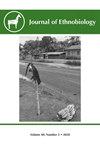构建传统:1970年代和1980年代墨西哥民族植物学研究中的反革命和性别
IF 1.3
3区 社会学
Q1 ANTHROPOLOGY
引用次数: 0
摘要
自20世纪70年代以来,传统知识的概念在民族植物学研究中得到了广泛的应用。世界规模的绿色革命项目的后果使人们认识到,小型和大型农业生产者之间以及发达国家和发展中国家之间的差距并没有弥合。正是在这种背景下,从20世纪70年代开始,墨西哥民族植物学研究人员开始整合生态、社会和政治观点,以促进农业生产的替代方式。在这里,民族植物学家推动了传统农业知识的复兴,作为一个更公正和负责任的农业系统的主要途径。然而,在实施这种意识形态的反革命中,民族植物学家构建了他们自己的传统意义,这在接下来的几十年里塑造了传统的解释方式。本文探讨了20世纪70年代和80年代在墨西哥进行的早期民族植物学研究是如何想象、颂扬和构建传统农业技术的,以此作为对现代农业的反击,以及在男性主导的叙事中,女性是如何被塑造成次要角色的。然后,该论点提出,这些早期作品是等级和性别的,这使墨西哥民族植物学和其他知识领域的反运动的庆祝叙述变得复杂。因此,这一分析反映了民族植物学研究中的传统是如何在特定背景下构建的,这是如何直接塑造性别结构的,以及后者对今天的影响。本文章由计算机程序翻译,如有差异,请以英文原文为准。
Framing the Traditional: Counterrevolution and Gender in Mexican Ethnobotanical Research Through the 1970s and 1980s
The concept of traditional knowledge has been widely used in ethnobotanical studies from the 1970s onward. The aftermath of world-scale Green Revolution projects led to the realization that disparities were not bridged between small- and large-scale agricultural producers and between developed and developing countries. It is within this context that from the 1970s, Mexican ethnobotanical researchers began to integrate ecological, social, and political perspectives to promote alternative modalities of agricultural production. Here, ethnobotanists pushed for the revalorization of traditional agricultural knowledge as the main avenue for a more just and responsible agricultural system. However, in implementing this ideological counterrevolution, ethnobotanists constructed their own signification of the traditional, which shaped how it would be accounted for in the following decades. This paper explores the ways in which early ethnobotanical research in Mexico through the 1970s and 1980s imagined, celebrated, and constructed traditional techniques in agriculture as a counter-response to modern agriculture, and with this, how women were framed as secondary actors in a male-dominated narrative. The argument then proposes that these early works were hierarchical and gendered, which complicates celebratory accounts of the countermovement in Mexican ethnobotany and other fields of knowledge. Therefore, this analysis reflects on how the traditional within ethnobotanical research has been constructed under specific contexts, on how this directly shaped gender constructions, and on the latter's implications to the present day.
求助全文
通过发布文献求助,成功后即可免费获取论文全文。
去求助
来源期刊

Journal of Ethnobiology
Social Sciences-Anthropology
CiteScore
4.80
自引率
3.40%
发文量
21
审稿时长
>12 weeks
期刊介绍:
JoE’s readership is as wide and diverse as ethnobiology itself, with readers spanning from both the natural and social sciences. Not surprisingly, a glance at the papers published in the Journal reveals the depth and breadth of topics, extending from studies in archaeology and the origins of agriculture, to folk classification systems, to food composition, plants, birds, mammals, fungi and everything in between.
Research areas published in JoE include but are not limited to neo- and paleo-ethnobiology, zooarchaeology, ethnobotany, ethnozoology, ethnopharmacology, ethnoecology, linguistic ethnobiology, human paleoecology, and many other related fields of study within anthropology and biology, such as taxonomy, conservation biology, ethnography, political ecology, and cognitive and cultural anthropology.
JoE does not limit itself to a single perspective, approach or discipline, but seeks to represent the full spectrum and wide diversity of the field of ethnobiology, including cognitive, symbolic, linguistic, ecological, and economic aspects of human interactions with our living world. Articles that significantly advance ethnobiological theory and/or methodology are particularly welcome, as well as studies bridging across disciplines and knowledge systems. JoE does not publish uncontextualized data such as species lists; appropriate submissions must elaborate on the ethnobiological context of findings.
 求助内容:
求助内容: 应助结果提醒方式:
应助结果提醒方式:


